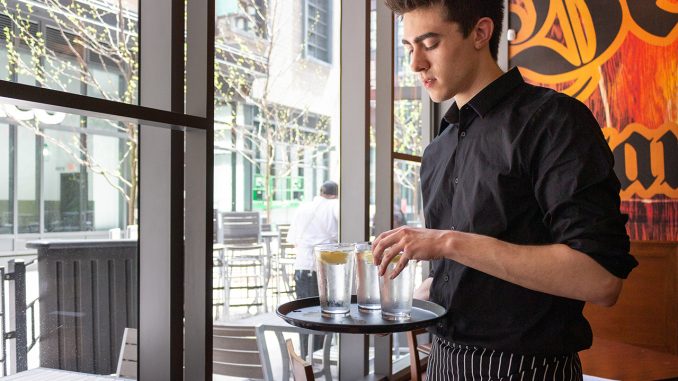
Each week, Celine Miro attempts to balance taking 18 credits of chemistry and physics labs, working eight hours per week on Main Campus and interning six hours per week about 40 minutes away.
In between, the freshman mechanical engineering major struggles with taking care of her basic needs.
“I wish I had time to eat and sleep,” Miro said. “I spend so many of my meals in front of a laptop or with a textbook. I don’t have to sit down and eat just to eat, everything is on the go.”
Many Temple students balance full-time studies with other responsibilities like jobs, internships and student organizations. Temple participated in an April 2018 survey by the Wisconsin HOPE Lab, a research center at the University of Wisconsin, Madison that relocated to Temple last year, found 82 percent of community college students and 79 percent of students at four-year universities are employed.
Temple students received $1,719,156 in work study, or wages partially subsidized by the federal government, during the 2016-17 academic year, according to the university’s 2017-18 Fact Book. Many other students hold jobs and internships outside of work study, too.
Jaycie Hricak, a junior political science and criminal justice major, works 30 hours per week at Tropical Smoothie on Broad Street near Cecil B. Moore Avenue to save to pay off her student loans. She also interns seven hours per week.

“I’m jealous of people that can devote all their time to school,” Hricak said. “I feel like if I didn’t have to work or force myself to intern for experience, I could probably have a 4.0.”
Hricak often stays up until midnight doing homework. She tracks her schedule with Google Calendar and planners to stay organized.
Junior human resource management major Sarah McCabe struggles to find time for homework on weekdays and spends Sundays studying at the TECH Center. This semester, she balanced full-time class, waitressing and interning two days per week in Media, Pennsylvania.
“Every time I get home from work, or the internship, or classes on certain days, I have no energy and I feel like I just want to get in bed because of how crazy the day has been,” said McCabe, who quit her internship last week.
Working long hours contributes to lower grades in college, according to the April 2018 HOPE Lab report. It can also impact students’ health because of lack of sleep or unbalanced nutrition.
Students experiencing homelessness or food and housing insecurity are “overwhelmingly part of the labor force,” said Liz Looker, the research project manager at Temple’s Hope Center for College, Community, and Justice, in an email. The center is the continuation of the shuttered Wisconsin HOPE Lab.
“We find that students who experience basic needs insecurity are working more hours than students whose basic needs are being met,” Looker added. “This tells us that even when students are working long hours, their basic needs are not being met.”
Hricak used to love attending group yoga classes, but doesn’t have time anymore because of her coursework, she said. Miro wishes she had more free time alone and with loved ones.
“Trying to find time to do things for my emotional health is really, really hard when it feels like all my academics take such importance over everything else,” Miro said.
Jack Fontana, a sophomore communication studies major, works four six-hour shifts per week at Iron Hill Brewery & Restaurant, on Market Street near 12th, to earn money toward next semester’s rent. He balances 16 credits of class and has to plan coursework in advance.
“I found that I can’t wait until the last minute to write essays,” said Fontana, who is a part-time busser and food runner. “I [used to] do that. Now that I work right before when it’s due, I can’t just do it the night before.”
He also has to schedule social time in advance, instead of making plans last minute.
For Hricak, managing her schedule prepares her for employment.
“I have amazing time management skills,” she said. “I do feel like me having to work and do all this stuff to sustain my life kind of makes me a more well-rounded person.”


Be the first to comment